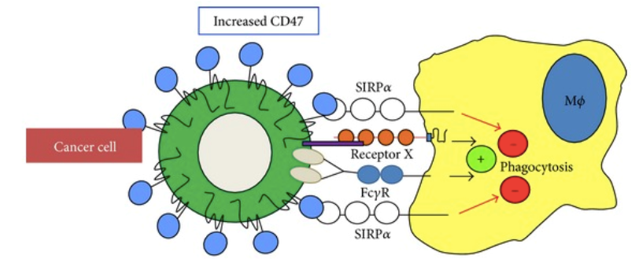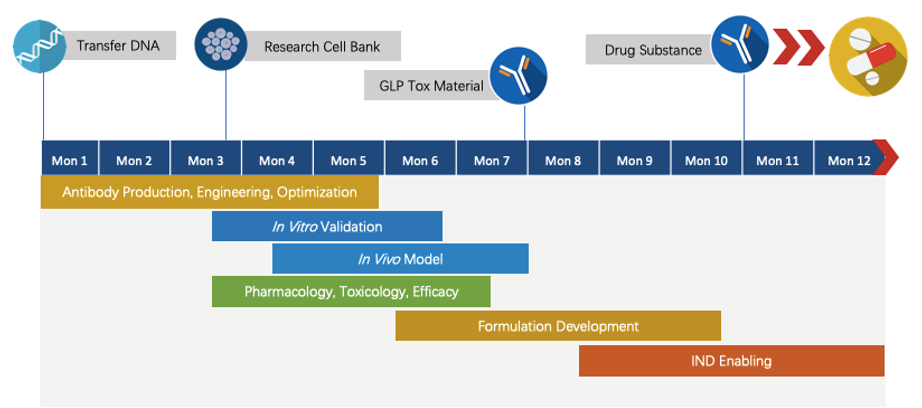Next-IO™ Anti-CD47 × CD20 Therapeutic Bispecific Antibody Program
About This Program
This program aims to develop CD47 × CD20 therapeutic bispecific antibody for immuno-oncology.
The development of antibody drugs from the CD47 target has been a hot topic in the pharmaceutical industry for years. When CD47 is overexpressing on the tumor cells, it can evade immune surveillance by emitting a "don't eat me" signal to macrophages. However, because CD47 widely exists in normal tissues, especially in red blood cells (RBC). The signaling is not always correct, sometimes severe off-target effects and hematological toxicity may happen, limiting the development of CD47 targeted therapies.
Given that fact that T cell activating-bispecific antibodies have demonstrated considerable activity in refractory B-cell acute lymphoblastic leukemia (refractory B-ALLs), we propose to develop a bispecific recombinant antibody that simultaneous targets CD47 and CD20 on B cells, which, hopefully, avoid non-specific antigenic sedimentation reactions and exert a potent antitumor effect.
CD47
CD47 is a membrane protein expressed in almost all cell types. Many cancers are shown to be over-activated by the CD47 signal, also named as "Don't Eat Me" signal. It can evoke immune interaction with the cellular signal receptor protein alpha (SIRPα) to prevent programmed cell removal (PCR). In particular, binding of SIRPα to CD47 promotes tyrosine phosphorylation in the cytoplasmic region of SIRPα, further producing the down-regulated signal to inhibit phagocytosis.
Highlighted Functions:
-
The "Don't Eat Me" CD47 signal counteracts the effective "eat me" signal produced by phagocytosis-activated receptors, such as the Fc-gamma receptor, complement receptor or low-density lipoprotein receptor-related protein 1 (LRP1).
-
CD47 is overexpressed in most blood and solid tumors and is particularly high in cancer stem cells (CSC).
-
CD47 blockade increases phagocytosis of tumor cells in vitro and enhances tumor therapy in many human xenograft models.
-
Recently, CD47 blockade has also been shown to support other anti-tumor mechanisms, such as ADCC enhancement.
 Fig.1 CD47 regulates phagocytosis of host cells by interacting with SIRPα. (Oldenborg, 2013)
Fig.1 CD47 regulates phagocytosis of host cells by interacting with SIRPα. (Oldenborg, 2013)
CD47 × CD20 in Cancer Studies
Here are some published data about CD47 × CD20 working as a potential target for cancer immunotherapy.
-
CD47/CD20 BiAb (CD20-CD47 SL) can reduce lymphoma burden and extends survival rate in an in vivo study.
 (Piccione, 2015)
(Piccione, 2015)
Ongoing Clinical Trials
-
Currently, NO anti-CD47 / CD20 bispecific antibodies are being evaluated in clinical phase I trials for its role in treating patients with relapsed or refractory B-cell lymphoma. Emerging preclinical data and upcoming clinical trials may provide a viable strategy to direct the synergistic benefits of combination therapy toward tumor cells.
-
In an effort to optimally leverage CD47 × CD20-mediated immune response, our next-generation CD47 × CD20 targeted antibody program attempts to explore the optimal combination strategy - that is, how to exert the best anti-tumor effect while synergistically expressing CD47 × CD20.
Program Planning and Management
Creative Biolabs has extensive knowledge of end-to-end program development. For each program, we are committed to delivering the final complete program to our clients within 1.5 years before entering the IND stage.

Cooperation
Creative Biolabs is looking for potential partners (include but not limit to major pharma or biotech firms) to develop CD47 × CD20 Dual-Targeting Fusion Protein program together. Our scientists are dedicated to bringing years of valuable experience to our partner and achieve a meaningful partnership together. For any partners interested in our Next-IO™ programs, Creative Biolabs welcomes collaboration.
Here are two ways for your choice, and please contact us for more details.
1) Collaborate with us and co-develop the programs from the discovery phase to IND enabling. Costs will be shared.
2) Become a licensed candidate for our programs.
With our quality control protocol and knowledge of global regulatory requirements, we can help our partners advance their with more chance to succeed. Look forward to cooperating with you in the near future.
References
-
Oldenborg, P.A. CD47: a cell surface glycoprotein which regulates multiple functions of hematopoietic cells in health and disease. International Scholarly Research Notices. 2013, 2013.
-
Dheilly, E.; et al. Selective blockade of the ubiquitous checkpoint receptor CD47 is enabled by dual-targeting bispecific antibodies. Molecular Therapy. 2017, 25(2): 523-533.
-
Piccione, E.C.; et al. A bispecific antibody targeting CD47 and CD20 selectively binds and eliminates dual antigen expressing lymphoma cells. MAbs. 2015, 7(5): 946-956.
For Research Use Only | Not For Clinical Use


 Fig.1 CD47 regulates phagocytosis of host cells by interacting with SIRPα. (Oldenborg, 2013)
Fig.1 CD47 regulates phagocytosis of host cells by interacting with SIRPα. (Oldenborg, 2013)
 (Piccione, 2015)
(Piccione, 2015)

 Download our brochure
Download our brochure